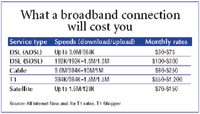Article
Going online: The need for speed
To exchange clinical data effectively, you need a broadband connection. But what kind should you get?
If all you're doing on the Internet at work is e-mailing, checking your stocks, and looking up journal articles, you may not have considered getting a high-speed connection. But once you connect to online clinical data sources, the picture changes. Whether you're e-prescribing, receiving lab results and X-rays online, or downloading hospital reports, you'll want to do it quickly through a "broadband" connection like DSL, cable or satellite, or a T1 line.
And if you decide to have an offsite vendor host your electronic health record or billing software and data, a broadband connection will be imperative. Let's look at your options. (To get a sense of what different types of broadband connections cost.)
A DSL ("digital subscriber line") delivers a digital data connection over the same phone line you use for voice communications. Your local phone company typically provides DSL service, although many Internet service providers also offer it.

Verizon ( http://www22.verizon.com) offers business DSL packages starting at $39.95 a month. Another vendor, Covad ( http://www.covad.com), has small-office packages from $64.95 a month.
High-speed Internet service may also be available through your local cable provider, and you don't need to hook up a TV to get Internet service. While cable broadband is generally available in urban and suburban areas, most rural areas don't have cable access.
The monthly rate for Business Class Optimum Online ( http://www.optimum.com/business), a regional cable operator in the NY metropolitan area, is $109.95, with additional one-time charges for a modem, installation, and additional cable line if needed. Another vendor, Comcast ( http://www.comcast.com), a regional cable operator in various areas of the US, has business packages starting at $95 a month.
In rural areas without cable service, practices may be able to obtain high-speed Web access via satellite. Satellite vendors often bundle their services, selling subscribers two out of three services: voice, broadband, and TV. "Some have put together some very competitive packages, but it's possible you may have to take something you don't want," says David Neil, of Gartner Inc., a technology consulting firm based in Stamford, CT. "You have to be careful, though. Satellite service can be affected by heavy rainfall, heavy snowfall, and sun-spots, which has to be taken into consideration if you're transmitting critical information." Typically, satellite delivered Internet is used for download and a standard phone line for upload.





